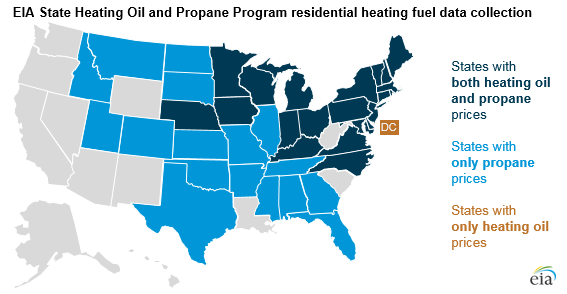April 14, 2020
The U.S. Energy Information Administration (EIA) produces two weekly reports that track the latest retail prices of select petroleum products: the Gasoline and Diesel Fuel Update (GDFU), which is published every Monday, and the Heating Oil and Propane Update (HOPU), which is published each Wednesday during the winter (October through March). Petroleum product price and consumption data published in these products illustrate market trends, such as the impact of recent crude oil price decline and reduced travel during the COVID-19 pandemic.
In addition to reporting weekly updates of retail motor gasoline and on-highway diesel fuel pump prices, the GDFU provides monthly updates of the various components that contribute to the cost of a typical gallon of motor gasoline and on-highway diesel fuel as well as biannual updates of federal and state motor fuels taxes. The report also provides U.S. average retail prices for regular grade motor gasoline dating back to August 1990 and on-highway diesel fuel dating back to March 1994.
Over the years, this publication has expanded to include more geographic areas and more fuel grades and formulations. Retail gasoline prices are now available for three octane grades and two formulations (conventional and reformulated) for 10 U.S. cities, 9 states, 4 sub-regions, 5 regions (Petroleum Administration for Defense Districts), and nationally. On-highway diesel fuel prices are available for one state (California), four sub-regions, five regions, and the national average.
The GDFU is published every Monday at about 5:00 p.m. ET. Each release is based on data EIA collects that same morning from a statistical sample of service stations and truck stops across the United States, making it one of only a few products that provide same-day data series published by a statistical agency of the U.S. government. Using the historical and latest price data, readers can compare longer-term prices against the same period for previous years or track the impact on prices over the past week that results from major events affecting gasoline and diesel fuel markets.
U.S. retail gasoline prices averaged $2.58 per gallon in the first week of 2020, the highest price at the beginning of the year since 2014. Recent decreases in Brent crude oil spot prices and reduced driving during pandemic-related quarantines and social distancing have led to a significant decline in average U.S. retail gasoline prices. The most recent GDFU, published yesterday, reports that the average U.S. retail gasoline price has fallen to $1.85 per gallon as of April 13, the lowest U.S. average gasoline price since early 2016.
During the winter residential heating season that runs from October through March, EIA also publishes the Heating Oil and Propane Update, which reports weekly residential heating oil and propane prices as part of EIA’s State Heating Oil and Propane Program (SHOPP). SHOPP is a joint effort between EIA and various state energy offices to collect state-level residential heating oil and propane price data in states where residential use of these fuels is common. Price data as of each Monday are collected from a statistical sample of respondents by EIA and our state partners each week for publication every Wednesday at 1:00 p.m. ET.
SHOPP began collecting data in 1978 and has expanded to provide timely price data during the winter. SHOPP data are used by state and federal governments, press, policy makers, consumers, and analysts to monitor markets and to facilitate an emergency response to any supply shortages of heating oil and propane during the winter. SHOPP collects residential heating oil and propane data in 21 states. In 17 additional states, SHOPP collects propane prices but not heating oil prices, and in the District of Columbia, it collects heating oil prices but not propane prices. Both residential heating oil and propane prices have been lower this winter than in the previous winter, by 11% and 24%, respectively.

Principal contributors: Amerine Woodyard, Marcela Bradbury
Original source: EIA.gov

